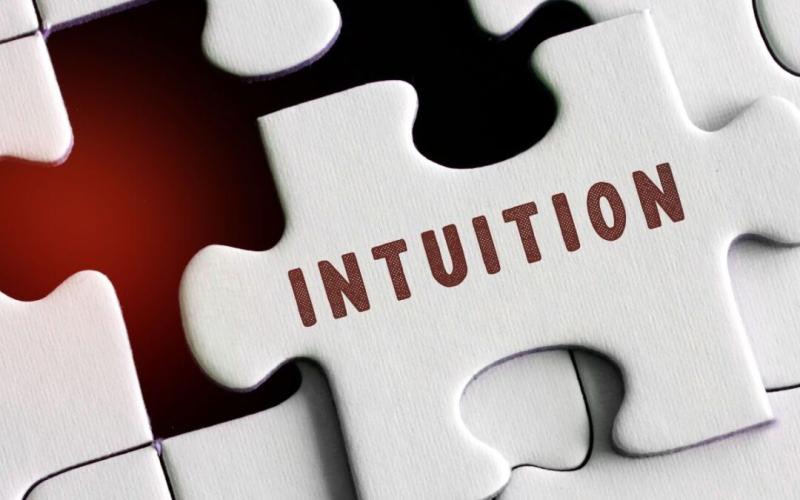Over the last several months, I have noticed some people can instantly decide what option to take. They operate at a processing speed that is lightyears ahead of me. It’s like they have an iPhone 15 locked up there, and I’m still using the one that takes up the whole room in the basement.

But they aren’t using their heads for logical thinking or processing at all, but their guts. They trust their intuition.
Intuition is the ability to understand something immediately without conscious reasoning – which explains the processing time. When you can tune in to trust your intuition, you kick your processor into high speed.
Careful analysis versus trust
Intuition is often fast but is it more prone to error? Logic and rationalization take time, but is it always right? Should we rely on logic even when we have time?
As a data gal, I love and believe in the power of having data to prove (or disprove) an approach. It is the runway that allows an idea to take flight. But as a data girl, I also know how prone data can be to errors and how folks can use it to support any objective. If unbiasedly collected data can be used to support any theory, why do we rely so heavily on the facts and so easily disregard listening to our intuition?
What Intuitive People Do
Intuitive people come from all walks of life, from creative artists to inspirational leaders. Learning to trust your intuition is a transferable skill to all areas of life, but there are a few standard things that folks are tuned into their intuition do.
- Practice mindfulness and stay focused on the present
- Self and body aware of what a “gut” feeling feels like
- Don’t hold on to negative thoughts
- Don’t fall victim to perfectionism
- Understand and challenge their limiting beliefs
The Benefits of Trusting Your Intuition
When you trust your gut, you are more likely to be more in alignment with your values and principles. It can also prevent you from getting into some pretty sticky jambs. Instead, alignment creates flow and ease in your decision-making process. Trusting your gut has spin-off benefits.
- Different and new perspectives
When you lean into your gut feeling, you start to challenge how you problem solve. You introduce new variables and take out assumptions. It’s a place to be creative.
- Easier to make tough decisions
It takes time to process and run through all the logic and create a rationale for each option. Gut instinct is (or can be) instantaneous. Now don’t get me wrong, there is a place for logic, reasoning, and thought. Combining your best guess and trusting is a way forward that can cut days off of tough decisions. Here’s the thing about intuition, it never falls victim to perfectionism.
- You accomplish more and feel more accomplished.
One of the biggest enemies of not finishing is perfectionism. We get stuck finishing. When you learn to trust your gut, you start to evaluate the importance of the last stretch. You evaluate finishing differently and you start to see things fly off your to-do list. And that feeling at the end of the day reinforces the trust you are building in yourself.
- Improved self-compassion, self-confidence, and wellbeing
It all comes down to trust. The more you learn to trust yourself and use your intuition, the less you hang on to doubt and worry. When you start using your intuition, you see such great things happen around you, and your confidence grows. You talk to yourself with more kindness and begin to know that you are less likely to label it as a failure when things don’t turn out as expected.
Building Up Your Intuition
We all have intuition, it is just a matter of learning to hear it before you start to listen to it.
1. Practice Building Trust
Find places in your life where you can start practicing using your intuition. Don’t attach yourself to the end goal, but be more connected to the process. With small experiments, you begin to learn what it is like to detach yourself from the outcome and remember to test your hypothesis.
2. Get Out of Your Own Way
Internal dialogue is a drag when it takes control of the situation. Start recognizing that this belongs to your inner critic and isn’t the present version of yourself. That internal voice might think it knows what’s best, but it’s usually just an old piece of programming for our past that’s stuck on repeat.
3. Stop Thinking So Hard
Take a break. Take a pause. Step away. When you intentionally step away it can quiet the inner critic. Your first thought is usually most connected to your intuition, but then all the options come in followed by analyzing all the options. Taking a break, changing your environment, or turning to creative practices – can give you the pause you need to quiet the voice so you can feel what your intuition is telling you.
Don’t let indecision take root. When you need to make a big decision about your career, it is vital to lean in and trust what you already know. Trust your intuition to get you over a rough spot and, most importantly, keep tuned in and be intentional.
You’re not looking for the perfect way; you’re looking for the best way. So start building your intuition muscle and find ways to tune in.


